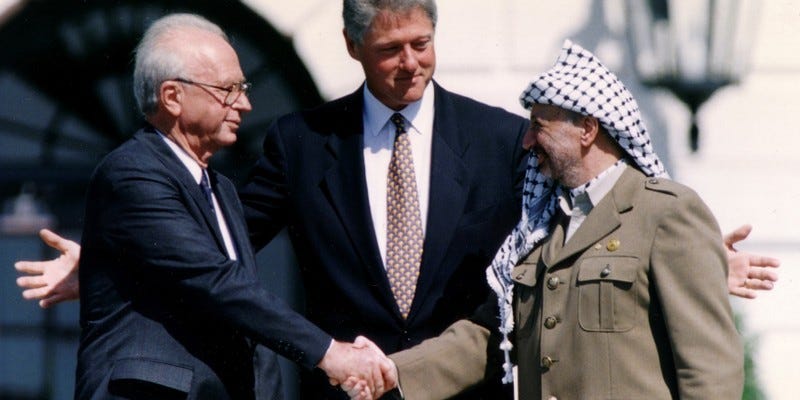
Thomson Reuters
- Oscar-nominated filmmaker Dror Moreh's new documentary "The Human Factor" takes an intimate look into the Israel/Palestine peace process through the eyes of US negotiators.
- Moreh spoke with Insider columnist Anthony Fisher about the delicate, sometimes comical, negotiations that kept the peace process alive and produced tangible progress.
- With violence raging between Israel and Hamas, civilians dying, and the two-state solution all but dead, Moreh is not optimistic for peace because brave leadership on both sides is missing.
- See more stories on Insider's business page.
Dror Moreh is the Oscar-nominated director of the 2012 documentary "The Gatekeepers," in which he spoke with six former heads of Israel's secret security service Shin Bet. Remarkably, all these lifelong warriors agreed that Israel's long-term security hinges on its efforts to end the Israeli occupation of the Palestinian territories.
Moreh's new film, "The Human Factor," takes you through decades of the Israel/Palestine peace process, as told through extensive interviews with the US negotiators.
Insider columnist Anthony Fisher spoke via Zoom with Moreh, from the filmmaker's home in Berlin.
Moreh says that the end of the day, leaders of nations are just human beings, and the human touch is what keeps peace negotiations alive.
He also says right-wing Israeli Prime Minister Benjamin Netanyahu and Hamas (the Islamist extremist group that controls the Gaza Strip) are more similiar than they'd care to admit, and he's less optimistic about the hope for Mideast peace than he's ever been. Moreh thinks "coexistence" – rather than "peace" – might be the best-case scenario.
This interview has been edited for style, clarity, and length.
Whenever there's a conversation to be had about Israeli-Palestinian politics and the conflict, I always tell people to see "The Gatekeepers."
And it's fairly incredible timing that your new film - about the long-dormant peace process - is coming out right now.
Thank you. I wish the film wasn't so relevant, but you cannot really control those issues.
In "The Human Factor," one of the US diplomats said his Arab counterparts made it clear that they don't view the future the same way as the US or Israel. To them, it's about fixing an injustice, and only then negotiating about the future, rather than "moving on" from the past and focusing on the future.
It feels like this gulf is an eternal stumbling block in Israeli-Palestinian diplomacy.
When I heard that sentence, I understood something fundamental which I didn't really realize up until then. It's just a fundamentally different way of approaching the future.
Having said that, I think the whole region, including the Israelis, are approaching this with the traumas of the past. Israelis - and I'm an Israeli - think about the Holocaust as something that is very fundamental in the approach to everything they see. Our leaders also use that.
Palestinians and Arabs see the past, judge the past, and say we cannot speak about the future. They want to address the Palestinian Naqba, the establishment of the state of Israel, and that Israel now occupies what they see as historical Palestine.
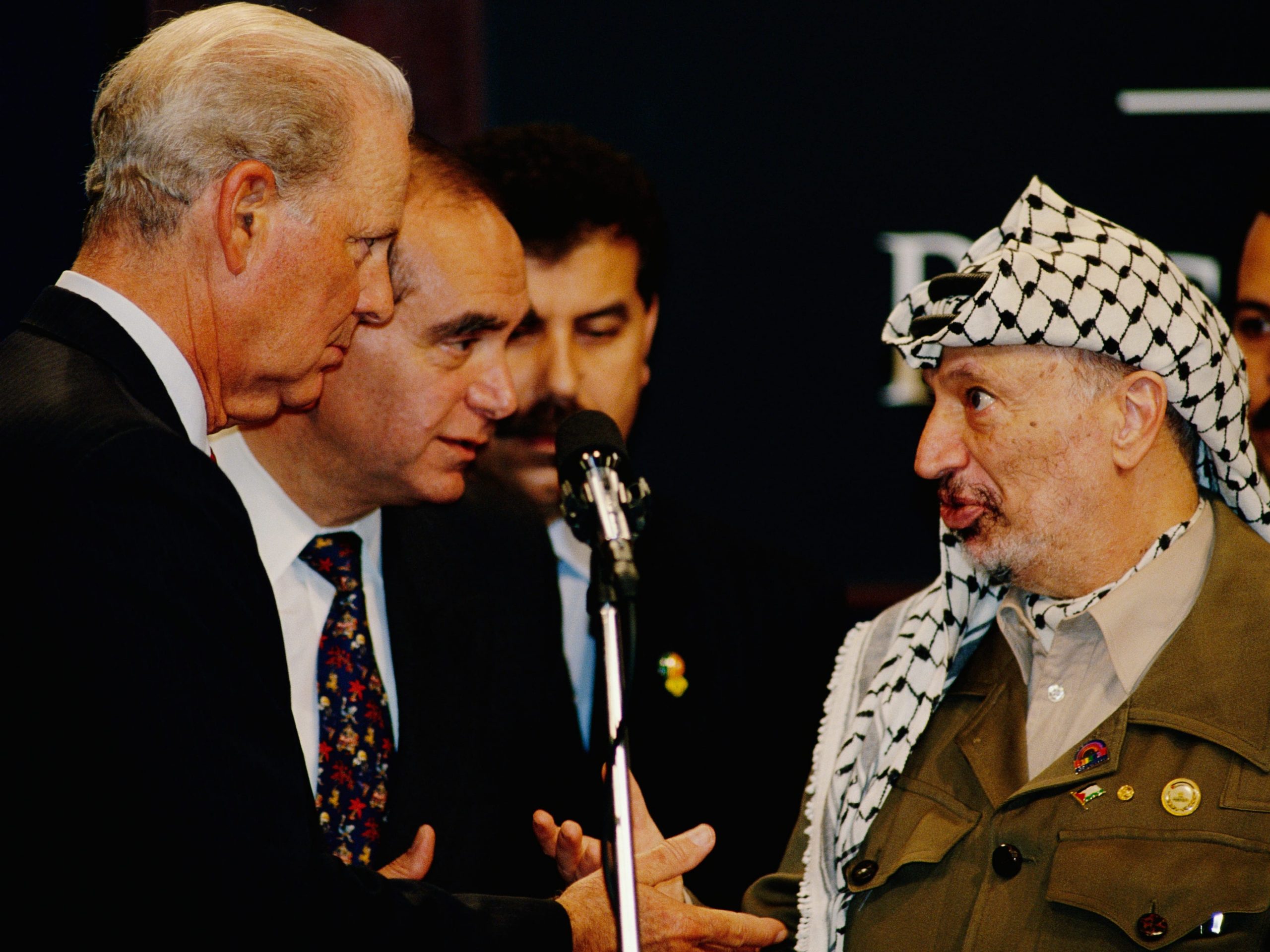
Greg Smith/CORBIS/Corbis via Getty Images
Everybody loves ... James Baker?
Early in "The Human Factor," there's a segment about former Secretary of State James Baker, who was perhaps the quintessential Reagan/Bush White House Republican.
It's almost unthinkable in our current political climate, but he was a fairly successful diplomat because he supported Israel, while also vocally criticizing the Israeli government. He would not just rubber-stamp every Israeli demand. And he was insistent that the Israelis meet the Palestinians on a level playing field, at least for the negotiations.
Across the board with all of the negotiators that worked with James Baker, they'll say if he had stayed on as US secretary of state, there would definitely be at least one peace agreement signed. [Baker left government when President George HW Bush lost reelection in 1992.]
That's because he was an effective mediator. Baker knew how to use the tools of diplomacy and the status of America as the global superpower to force people who were reluctant to move forward, and to bring them together to create something which was not there before. All of that changed when he left office.
When President Clinton took office, he appointed Warren Christopher as secretary of state. He had a completely different approach. He was much more hands off.
My problem with American involvement in the peace process is in how America deals with a prime minister of Israel who is reluctant to move forward towards peace. With a prime minister who's for peace you just have to support him and give him assurances that the United States will back him up.
With [current Israeli Prime Minister] Benjamin Netanyahu, I think America has much more leverage over Israel than it uses. If America decides that bringing peace between Israel and its neighbors is a core American interest, the way that America approaches it should be different when you're dealing with a prime minister like Netanyahu, who's not for peace.
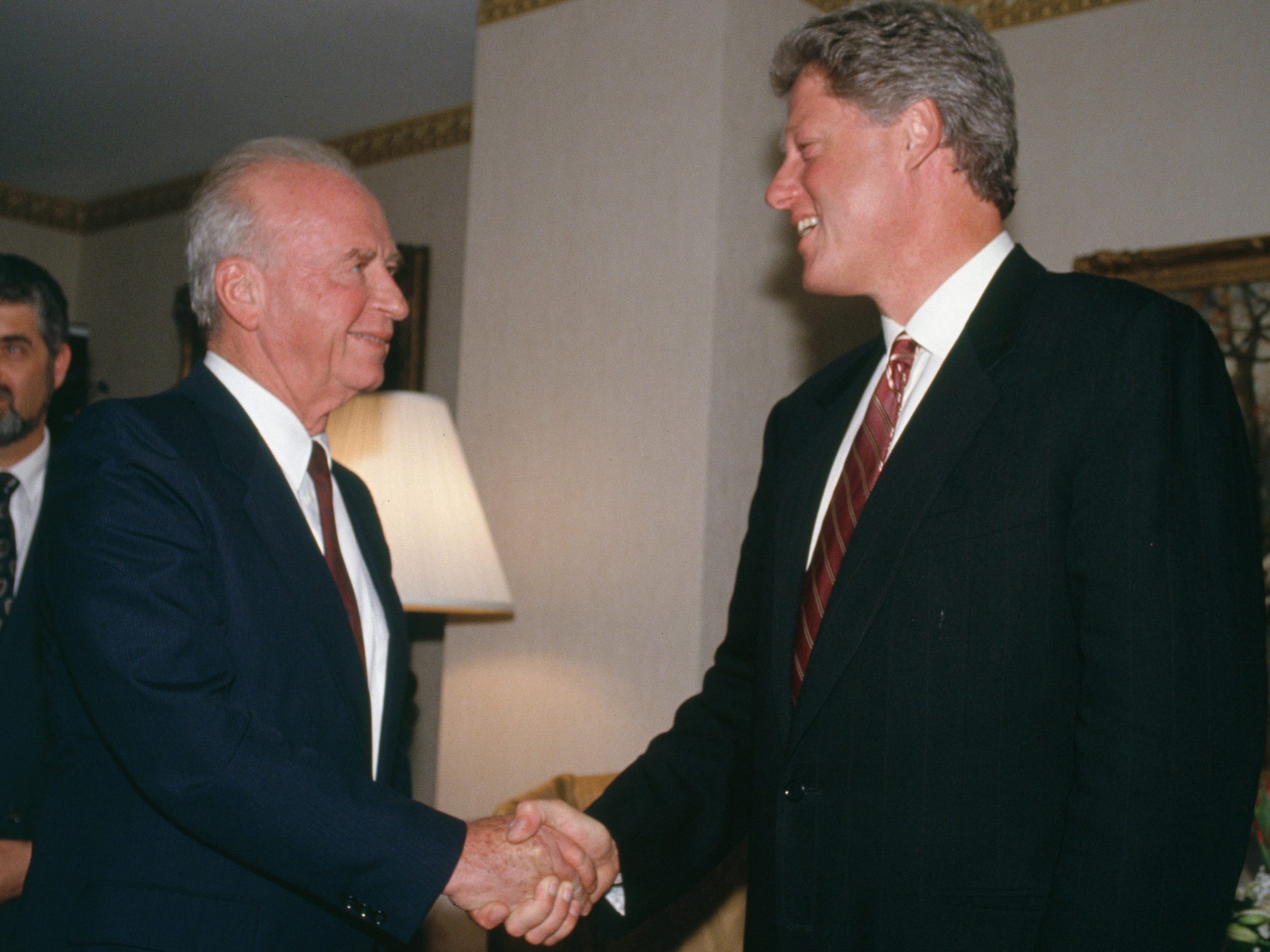
Jeffrey Markowitz/Sygma via Getty Images
"Netanyahu owes his career to Hamas"
There's a scene in "The Human Factor" where one of the diplomats tells you that former Prime Minister Yitzhak Rabin warned of a coming Israeli civil war over the peace process.
A few years later, Rabin was assassinated by a right-wing extremist. Can you talk a little bit about that moment?
Rabin, even before he took the first steps toward peace, said to [US Middle East envoy] Dennis Ross, "When I reach the point where I give the Palestinians what I need to give them, there's probably going to be a civil war. And I need my boys in the army's support."
It was amazing how clearly he saw what was going to happen, he almost predicted it. And even in spite of that, he went for peace. That's the personification of leadership to me.
Rabin, who was defense minister during the the first intifada, saw the uprising of Palestinian youngsters going to the street, not afraid of bullets, not afraid of guns and saying, "We are here. We want independence. We want to control our lives."
And Rabin started out as defense minister saying, "break their arms, break their legs." But by the time he became prime minister he said, "This is an existential threat to Israel, and I have to solve it while there is this window of opportunity, while America is the only global superpower, and the world has changed."
Even though he saw the risks, Rabin said, "I have to go for peace."
After him, the only leader was Ariel Sharon, who [in the mid-2000s] decided on disengagement with the Palestinians. The rest were merely small petty politicians.
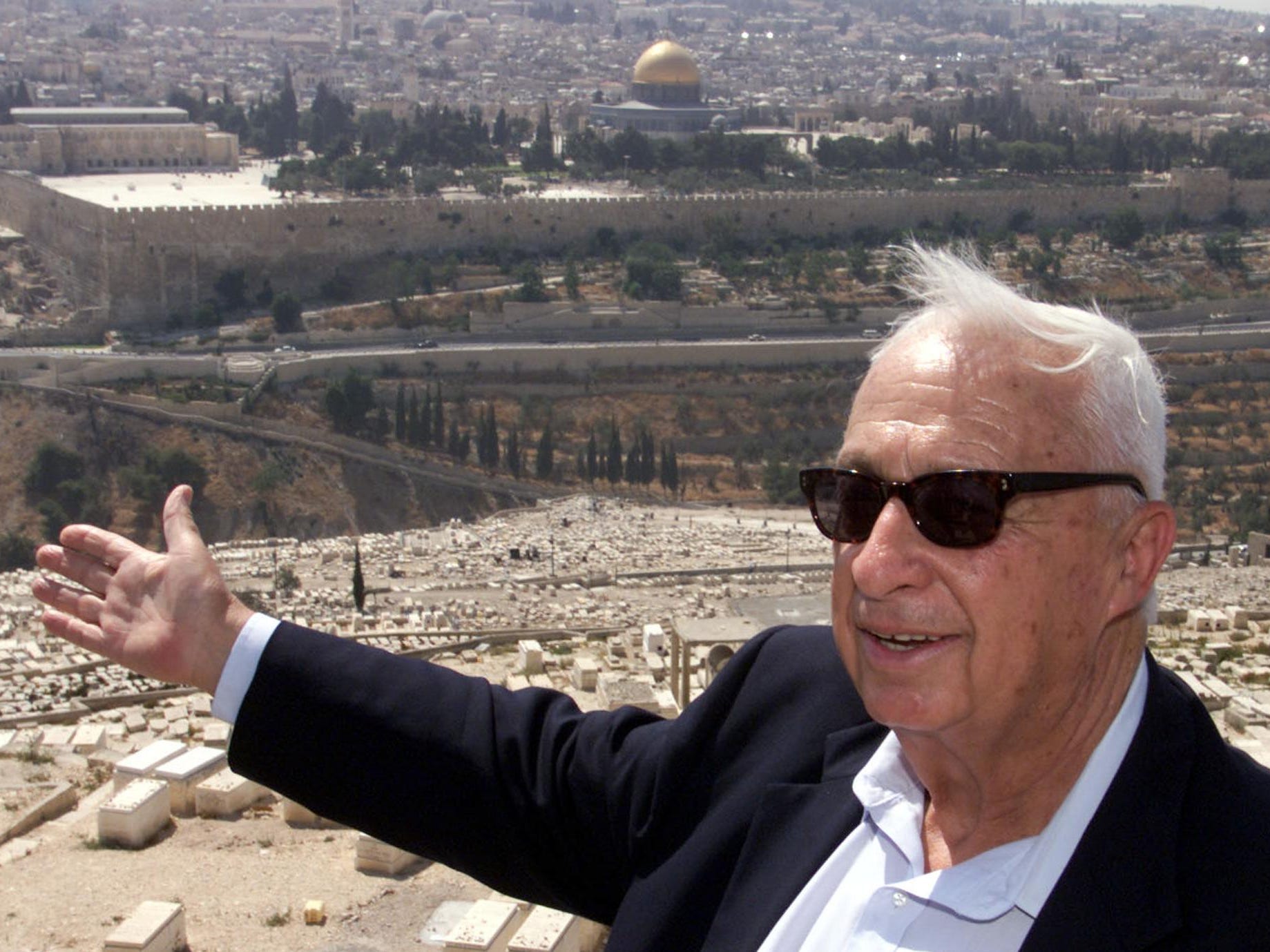
MENAHEM KAHANA/AFP via Getty Images
Sharon had a reputation of being a tough-as-nails warrior for Israel's interest. He was even accused of war crimes. And then as prime minister, he was for total disengagement. He even left the right-wing Likud party to form his own Kadima party and unilaterally pulled the Israeli military and settlement presence out of Gaza.
At the time, the majority of Israeli society was firmly behind Sharon and still believed in a two-state solution. It feels like after 12 years of Netanyahu, that public sentiment for peace is no longer there. Would you agree?
Totally. Netanyahu basically killed the two state solution. I don't see any hope any more for a two state solution. The biggest shift for Israeli society is the constant movement to the right by Netanyahu.
When he came to power in 2009, Netanyahu said, "I'm going to crush Hamas." There have been four conflicts with Hamas since then. Basically, Netanyahu and Hamas are keen brothers. They work for the same goals.
If we go back to Rabin, the first suicide attack was by Baruch Goldstein, [the Jewish extremist] who committed the massacre in the Cave of the Patriarchs in Hebron. Hamas was not doing suicide bombing before then, because there was support among the Palestinian people for the peace process. After the massacre, Hamas started suicide bombing.
So in a way, Netanyahu owes his career to Hamas. He became prime minister the first time after the huge wave of suicide attacks in the beginning of February 1996, which crushed [then-Prime Minister Shimon] Peres and brought Netanyahu into power.
By the way, a week and a half ago, Netanyahu was on the way out, there was a very big chance that Yair Lapid would establish a unity government. And then Hamas sent those missiles to Jerusalem and all hell broke loose. And now Netanyahu's still there and nobody's speaking about a unity government.
The nail-biting negotiations over a handshake
In "The Human Factor," there's a remarkable scene detailing the intense negotiations that went into the handshake between Rabin and Palestinian Liberation Organization leader Yasser Arafat.
Rabin insisted that Arafat not carry a gun, not wear his military-style uniform, and that there'd be no kissing. It's kind of a light moment in the movie because it seems so silly. There's so many lives at stake and this is what they're quibbling over.
And yet, it was a great story because it illustrated the difficulty of the diplomats' jobs. It showed how these things that seem so trivial and ancillary to the true crisis could be, in fact, deal breakers.
The biggest revelation is the importance of "the human factor." You see these moments where a historic peace agreement is signed between two leaders. But at the end of the day, it's about two human beings coming together and learning to know each other.
If you look at the Clinton White House photographer's pictures right before the historic Rabin/Arafat handshake, you see the expression on Rabin's face. He looks at Arafat and Bill Clinton in the middle, and his face says, "What am I doing here? Who is this guy? What the hell is going on?"
Then a year and a half later, Rabin and Arafat meet. And there's the beautiful scene in the film where they have to decide whether the Palestinians will have a police station in the Oslo II Accord.
Arafat says, "Whatever is acceptable to the prime minister." And Rabin says they will have a police station. You see their two faces, and you see the change between the handshake and this moment later. That's the whole story in a little capsule.

Abid Katib/Getty Images
You just talked about Netanyahu and Hamas having a sort of symbiotic relationship. Going back to "The Gatekeepers," there's a section where the Israeli right turns against the Oslo Accords - which established the Palestinian Authority as a legitimate government entity that recognized Israel's right to exist.
There were young kids and their fathers in the street chanting, "With blood and fire we will throw Rabin out."
And in short order Rabin was assassinated, Netanyahu was elected for the first time, the peace process fell apart, and Hamas got exactly what it wanted.
Yeah. It's a strange combination. I see a lot of parallels between Hamas and the extreme religious right-wing in Israel.
Both of them think the land of Israel [or] the land of Palestine is Holy Land. And nobody's allowed to give that up. When you see the texts of the extreme right-wingers in Israel, and the texts of Hamas, they're very similar. In that sense, they work with each other very well.
I wish there were an island where we could put them both together, and let the moderates live peacefully. It would be much better.
But regrettably in the peace process, and also today, the extremists from both sides are the ones that dictate the day.
Rabin's whole concept in 1993 when he signed the Declaration of Principles [which led to the Oslo Accords] was very vague. It was to be a process, like the first Camp David meetings [in 1978] with Egyptian and Israeli negotiators. You build a process on relations and trust, and then you move to the really hardcore negotiations.
But the more time passed, the more cynical people got, and the less people trusted the process because those extreme factions came and basically killed it altogether. And the height of that was the assassination of Rabin by an extreme right-wing Israeli religious fanatic.
"No strategy, just tactics"
In "The Gatekeepers," one of the former Shin Bet chiefs said that no matter whether the prime minister was Menachem Begin of Golda Meir or Shimon Peres - there was no political strategy to achieve long-term security, just tactics to tamp down on security threats.
Rabin certainly tried to challenge the status quo politically, as did Sharon - albeit in a much different way. Do you see support from the Israeli people now to change the status quo - which is basically permanent occupation? Is there any desire in Israel to resume the peace process?
Look, I can speak for myself. I cannot speak for all Israelis. There's a variety of opinions. My point of view is that the status quo is what keeps the moment.
Rabin said this will kill Israeli society - this occupation, and containing people who do not want to be occupied and want their freedom. It will be corrosive to Israeli society. Sharon, when he became prime minister, said the same thing. They were leaders trying to move something in order to resolve the problem. We don't have that now.
When you see what Sharon did with the disengagement from Gaza, and the amount of effort to do that and all the resistance from the Israeli right and extremists, it looked like a mission impossible.
And here we are speaking about Gaza - we are not speaking about Judea and Samaria (the occupied West Bank), the biblical ancestral lands of the Jewish people, the place where our forefathers walked and all kinds of stupid [arguments from the right].
When the prime minister has to decide to go for something like that, which he knows will tear Israeli society apart, you need to be very brave to do that. But the Israeli people get promises [for those exchanges] that they'll get to live in peace.
After the Oslo Accords, there was the eruption of suicide attacks, the collapse of the [second] Camp David negotiations, the second intifada - and also the disengagement from Gaza, which allowed Hamas to take over Gaza and fire missiles constantly into Israel.
That's the reason most of the Israeli public doesn't really trust that there is a partner on the other side that can maintain security.
I totally agree with what [former US Middle East diplomat] Aaron David Miller said in "The Human Factor," which was, "Let's take the word 'peace' out of the vocabulary, and let's try to build coexistence. That is what we can aim for, at least for the next few decades.
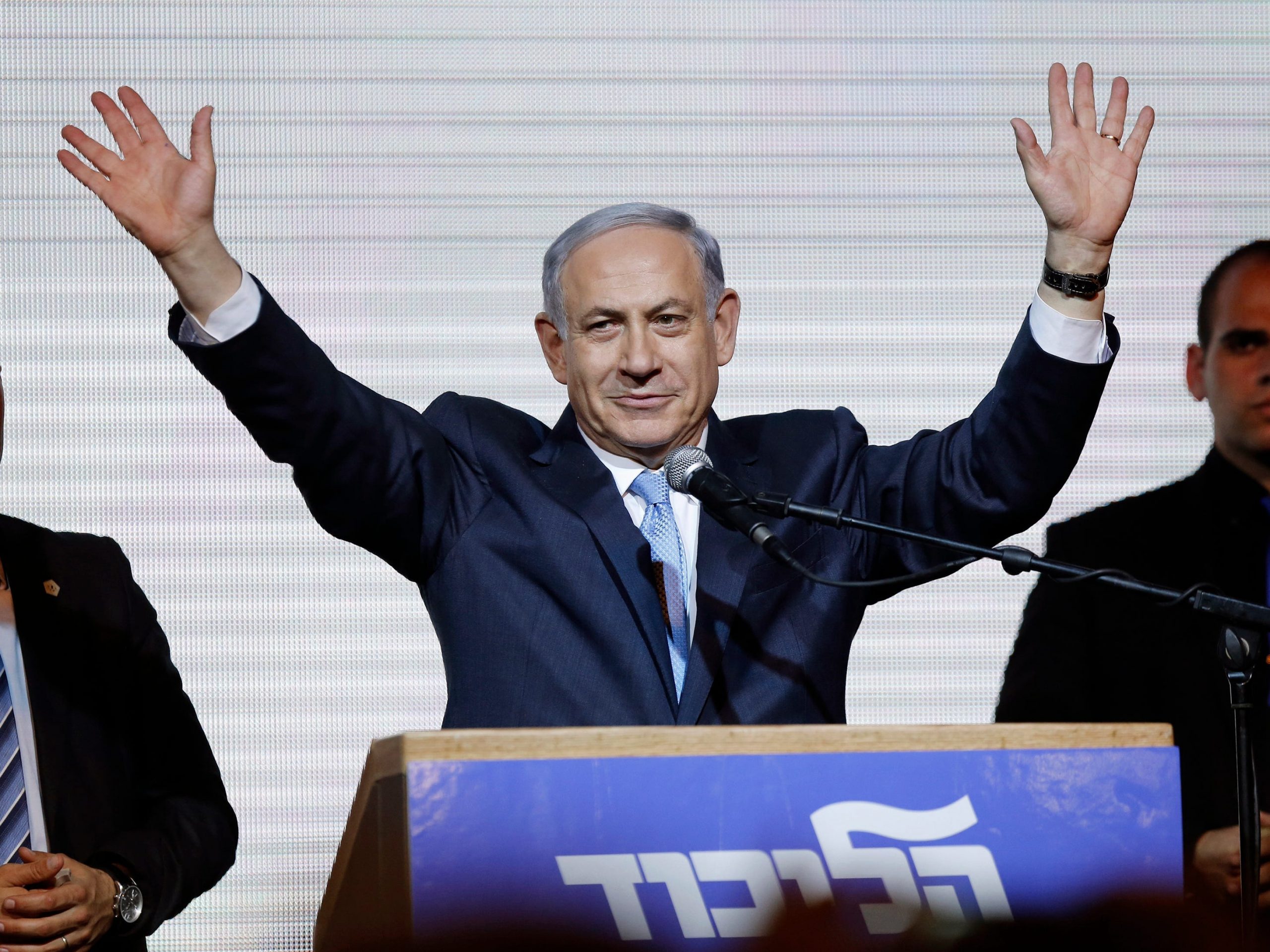
Reuters
Not peace, but "coexistence"
Part of why I tell everyone with an an interest in the Israeli-Palestinian conflict to watch "The Gatekeepers" is because it's so stunning to listen to these men who devoted their entire lives really to the security of Israel all come to similar conclusions.
One of them said, "You can't make peace by military means." Another said that even if your adversary "answers rudely," you should still continue to pursue the conversation. And another said, "Israel wins every battle, but we may lose the war." They all come to the conclusion that the only long-term solution for Israeli security is a disengagement with the Palestinians, which would mean a two state solution.
Israelis have a sarcastic phrase they'll use for naive peaceniks: "You're a beautiful soul."
But here are the hardest of the hardcore Israeli security guys, and they're saying we've bombed and maimed and killed in the name of Israel and the only way this country will survive in the long-term is through disengagement with the Palestinians.
Is there any chance this advice lands in the ears of the Israeli youth, where there's some hope for a future in which coexistence is pursued?
I have to tell you, Anthony, that I lost hope. That's the bitter truth.
I mean, look at the Gaza conflict. How many times have we bombed Gaza? How many times have we gone into a war? And, as we discussed, it's all tactics, not strategy. It's about sustaining and maintaining today and continuing to live in seemingly peaceful conditions until the next thing. So, no, I don't think that this message can now land on Israeli ears.
We've been with the same politician as prime minister (Netanyahu) for 12 years. His impact on the [political] reality is huge. He's negotiating and working with Hamas and downgrading and humiliating the Palestinian Authority. Benjamin Netanyahu is much better working with Hamas than with someone who says they're for peace.
I hope there will be another leader soon. But I don't believe we'll see that kind of new leader from the Israeli political arena soon. It will take a few years before something can evolve in that sense.
And by the way, it's the same with the Palestinian Authority. Abu Mazen (Prime Minister Mahmoud Abbas) is 87 years old. He cancelled the Palestinian elections that were supposed to happen a few weeks ago. It's one of the reasons for the current conflict.
But say you have a successor to Netanyahu and a successor to Abu Mazen, you still have Gaza, which is ruled by Hamas. So wherever you look, it's not very optimistic.
Almost all the former army chiefs of staff, all the heads of Shin Bet, all the heads of the Mossad, and all the heads of army intelligence, are for negotiation and for a two-state solution.
But you have a charismatic politician (Netanyahu) who is basically a good salesman. I mean, look at Trump. Look at what Trump did to your country. It's unbelievable. You think that democracy is very stable and very strong, but when you have a demagogue who knows how to [manipulate] the media very well, this is where we are.
One thing I'm hoping people get out of this movie is the importance of the human factor. I'm currently doing a huge project about American politics encountering genocide, part of a series for American audiences, and for all over the world. And the importance of the human factor inside the decision-making room is stunning.